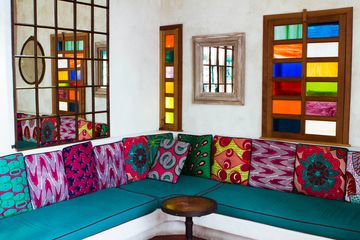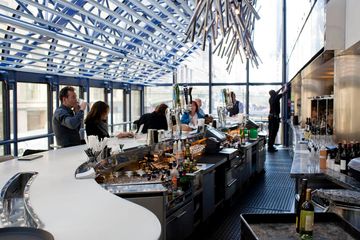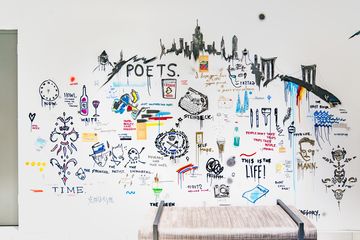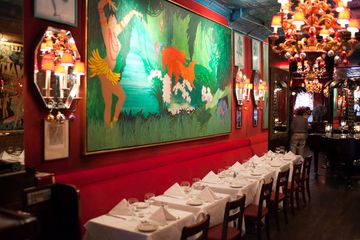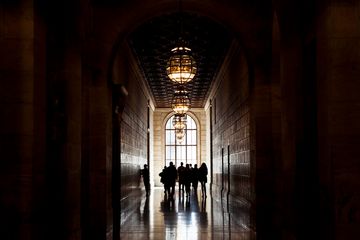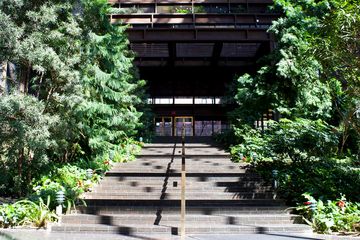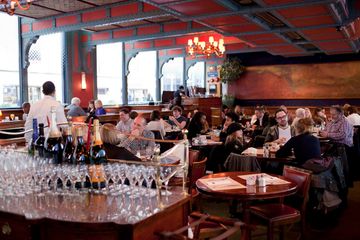As someone who once owned a bookstore, I was delighted by each of the little surprises and details hidden throughout the Renwick. I walked into the lobby to find a multimedia mural on the wall, designed by Gregory Siff, decorated with items that were found when the original hotel was renovated. There were yellowing letters attached to the wall along with depictions of New York landmarks and pieces of the lives of John Steinbeck and Thomas Mann, both of whom lived here when it was filled with artist studios and lofts. I was eager for Tom and Olivia to arrive, as I knew that they, too, would appreciate the hotel's celebration of writers and artists, which begins with the name: James Renwick is the man who, with no formal training, was the main architect behind St. Patrick’s Cathedral in the nineteenth century. The artistic flourishes continued along the walls of the lobby. A bookcase had a clever column of Steinbeck’s books lined up with a painting of the author on their spines. On the stairs down from the door, which looped around to become a bench, there were succulents in glass cubes perched on top of additional piles of books. David Israel, the Asset Manager, explained that the hotel brought in seventeen local artists to work on the overall design. He pointed out the outline of people at the park made out of string and nails just to the left of the door. David informed us that the piece took the artist five nights to create on the wall and that it represented a snapshot in the story of her family. “There is art everywhere, ” David said simply. To prove his point, he took us outside where Gregory Siff had tagged all four sides of the hotel’s temporary water heater with graffiti. From the art to the amenities, everything is made in New York. David told me this while pointing out that the wood paneling behind the concierge came from the building’s original water tower. The bed linen, the bath products, and the room fixtures all come from within the city. Even the hotel restaurant, Bedford and Company will serve New York distilled spirits when it opens at the end of 2015. Stepping into the almost completed space, I could already sense the warm atmosphere that the midcentury design would produce. It felt like a club where the artists of New York’s Golden Age would sit around and swap ideas. Each of the rooms upstairs had details that were artsy and playful. David explained that the Renwick is trying to “bring a more edgy, Soho feel to Midtown. ” He went on to say that the hotel has tried to create a room both for the creator and for lawyers and businessmen, making it perfect for weekday and weekend travelers. David was proud to announce that there are no double beds in the hotel: the smallest size is a queen. He opened the door onto a room that was decorated in honor of Thomas Mann, with his face painted on the white wall and his quotes scattered around the room. I found it fascinating that the Time Magazines on display throughout the hotel were found during the renovation, and that the New York City skyline painted on the blinds is common to all rooms, but that each one is unique. “There is no framed art in this building – everything is functional, ” David said. My creativity was sparked everywhere I looked: the cup holder was made from paper mache pages of the great Gatsby, the robes mimicked artist smocks with an embroidered dash of paint on the back, and the Do Not Disturb signs took the form of paintbrushes. Even the notepad, a staple of most hotel rooms, doubled as origami paper. We thought that the Mann room was creative, however we were blown away by the next room, which David told me was specifically crafted for the artist in all of us. Easels were scattered throughout the room with different size canvases. The cup holder, which in the other room held pens, was filled with paintbrushes of every size and shape. On the notepad, there was a little drawing. David said that many of the housekeeping staff, whom he refers to as “creators, ” are artistic themselves, and are encouraged to leave their work for guests. Though we did not see it, David informed us that there is also a writer’s suite, complete with a typewriter. Even though the Renwick had only been open a month when we visited, he said that he had already had repeat guests requesting specific rooms. After showing us the Hemingway Suite, which has a little rooftop balcony, David led us back down to the lobby, pointing out the original mail chutes and elevators. On our way out, I could not help noticing that there really was art everywhere: on the walls of the fitness room, in the bathrooms, in the stairwell. I was reminded of the quote from Andy Warhol that I had seen on the wall of one of the guest rooms: “Art is anything you can get away with. ”
